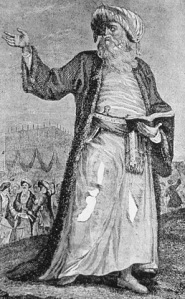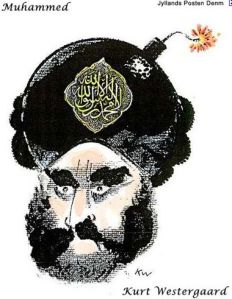June 7: Muhammad
Muhammad (d. 632)
It was on this date, June 7, 632, that the Prophet Muhammad (محمد or, transliterated, Muḥammad) died of a stroke at Medina. Muhammad was born on a date uncertain in 570 in Mecca, in what is now Saudi Arabia, orphaned, brought up by an uncle, and became a camel driver and shepherd as a boy. When he was about 25 he married a rich widow and became a merchant. Muhammad thought it tragic that his Arab race were idolaters and polytheistic, so in 610 (he was about 40) he started having visions from the Angel Gabriel and began a life as a prophet and teacher.
The religion he founded, Islam, means "submission," as in submission to the one God. Islam was resisted at first because of its novelty against the ancient tribal customs. Muhammad's wife died in 620, but he acquired up to a dozen more wives over the years, including at least one (Aisha; عائشة) we would today consider under-aged—the marriage was consummated when she was nine. In 622 Muhammad was forced to flee from Mecca to Yathrib, which is now called Medina, and found his religion welcomed there. The date of that flight is called the hegira and that event marks the beginning of the Muhammadan era. His followers helped him punish the ungrateful Meccans, and after victory there extended his triumphs throughout Arabia.
The holy book of Islam, the Qur'an (لقرآن or al-qur’ān), means “the recitation” or "the lesson"—of God (لله, Allah). It was jotted down, on bits of skin and palm-leaves, during the last twenty-two years of the Prophet's life. The fragments were collected in the year after the Prophet's death, and an authorized version circulated in 650. It was Muhammad's successor, a convert named Omar, and a genuine fanatic, who reunited the apostates after Muhammad's death by declaring war on rich Persia. As one historian (William Muir) put it, it was "the scent of war that turned the sullen temper of the Arabs into eager loyalty." Or perhaps it was the scent of loot. As another historian (Carl Heinrich Becker) wrote, "hunger and avarice, not religion, were the impelling forces" of the Arab expansion, and that "it was not the religion of Islam that was disseminated by the sword, but political sovereignty."
Inasmuch as the Qur'an reflects the ideas of Muhammad, a few points need to be made. First, neither in Islamic history nor in the Qur'an is Islam a peaceful religion. Not, that is, with its founder prescribing the cruelest penalties for disbelief or apostasy or for turning away once exposed to Islam—or for resisting the conquest of the believers. And so we have such verses as,
2:216 Warfare is ordained for you, though it is hateful unto you; but it may happen that ye hate a thing which is good for you, and it may happen that ye love a thing which is bad for you. Allah knoweth, ye know not.
and
3:169 Think not of those, who are slain in the way of Allah, as dead. Nay, they are living. With their Lord they have provision. (Quoted by Osama bin Laden in his “letter to America” regarding the 11 September 2001 attacks on the U.S.)
and
58:14 Hast thou not seen those who take for friends a folk with whom Allah is wroth? They are neither of you nor of them, and they swear a false oath knowingly.
58:15 Allah hath prepared for them a dreadful doom. Evil indeed is that which they are wont to do.
It was not moral suasion that made Muslims of millions from Spain to India, including non-Arab Zoroastrians like the Persians. Second, it is not true that Islam is a tolerant religion. If we discount the early suras in the Qur'an, which were revealed when Muhammad was struggling for acceptance, and concentrate on the later ones, revealed when Muhammad was master of Arabia, you will understand the context of holy words such as,
22.19-22:22: As for the unbelievers, for them garments of fire shall be cut and there shall be poured over their heads boiling water whereby whatever is in their bowels and skins shall be dissolved and they will be punished with hooked iron rods.
and
47.4: When you meet the unbelievers, strike off their heads; then when you have made wide slaughter among them, carefully tie up the remaining captives.
There is much uncertainty about the events of Muhammad's life because, as with the life of Jesus, no one thought write down a history until many years after his death—in the case of Muhammad, until 100 years after his death. Furthermore, because Muhammad was illiterate, he memorized his visions and dictated them afterwards, sometimes long enough afterwards to have forgotten contradictory earlier visions.
Originally published June 2003 by Ronald Bruce Meyer.



